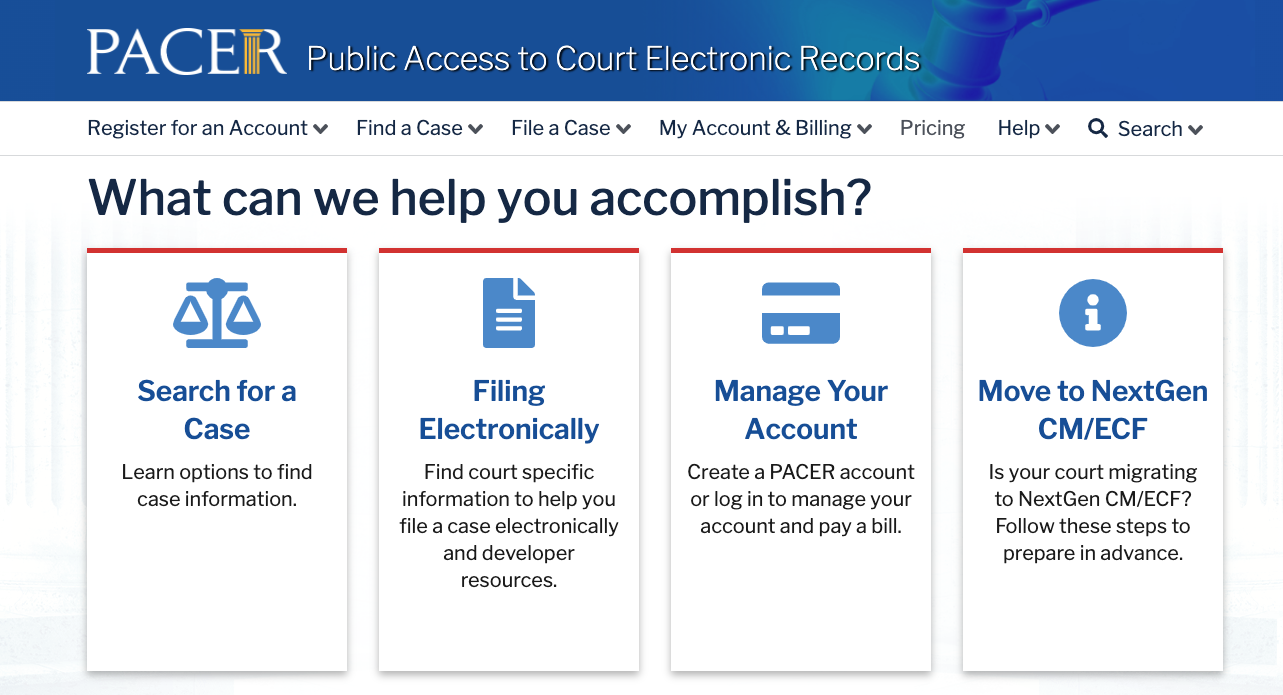Appeals court ruling paves way for reduced electronic court records fees

In a development that highlights continuing efforts to expand public access to court records, the U.S. Court of Appeals for the Federal Circuit handed down a decision in August restricting the federal government’s ability to charge fees for electronic court records.
The court’s ruling is a win for the press — including many independent journalists or those affiliated with smaller publications — and, by extension, the public, who will benefit from the wider reporting on judicial proceedings that reduced fees will allow.
To quickly summarize the history, Congress first authorized the creation of a digitized court record system in the early 1990s, leading to the development of Public Access to Court Electronic Records, or PACER. Unfortunately, Congress did not authorize funds for this program, and as a result, users of PACER are charged a fee, on a per-page basis, for access to court dockets and case records.
Those fees are at the center of the dispute in National Veterans Legal Services Program v. United States. By statute, the judiciary may “prescribe reasonable fees” for electronic court records. This raises the question of what is “reasonable.” For context, PACER fees are used to fund several other programs besides the PACER system, including one that allows attorneys to file and update documents electronically, another that notifies police when documents are filed in the cases of individuals out on supervised release, and a system that provides prospective jurors with electronic copies of documents related to their jury duty.
The three nonprofit organizations that brought the case argued that “reasonable fees” are only those that cover the cost of operating PACER, and no more. In response, the government maintained that the judiciary could charge as many fees as necessary “to fund the dissemination of information through electronic means.”
The district court charted a middle course, finding that the statute was meant to permit fees to be charged for “providing the public with access to electronic information maintained and stored by the federal courts.” Practically, this meant that PACER fees could be used to fund the system for filing and updating documents digitally, but they cannot be devoted to police or juror notifications.
Both sides appealed and essentially restated their claims about how “reasonable fees” should be interpreted. Last year, the Reporters Committee, along with a coalition of 27 media organizations, filed a friend-of-the-court brief in support of the nonprofits, pointing out the myriad ways that journalists rely on court records in their reporting and explaining that charging excessive fees “effectively shut[s] out” some journalists and members of the public from access. The brief also emphasized the First Amendment and common law right of access to public records such as court documents.
The Federal Circuit upheld the district court’s ruling, finding that it conformed to the legislative history and intent behind the statute authorizing the PACER system. Especially relevant to the court’s decision were the manifold references in the statute and its accompanying congressional reports to “public access,” suggesting that the funds should not “be used to promote access purely for select entities or individuals,” like police and jurors. To the extent the court found that other programs like the attorney filing system do promote public access, it declined to restrict PACER fees to solely funding PACER itself. Finally, the court advised in a footnote that the question of whether to charge fees at all should be left to Congress rather than the courts.
Ultimately, this decision invalidates the utilization of PACER fees as a source for funding multiple programs. In theory, then, fees for court records should be reduced to the level needed to support the remaining systems.
That said, a completely free electronic court records system would be preferable. In the meantime, journalists and interested citizens have other budget-friendly resources available to access court records. For example, the Free Law Project is a nonprofit that developed a software tool called RECAP to enhance access to court records. When a user who has the RECAP add-on in their web browser downloads a document from PACER, that document is automatically uploaded to a public and free website. In this way, RECAP has made millions of court opinions, dockets and other court records readily available to the public.
Additionally, instead of incurring fees by periodically checking PACER for case updates, journalists and others can instead subscribe to the RSS feeds that many federal courts have enabled on their individual PACER systems. Through monitoring RSS feeds, members of the press will be notified of new cases and filings at no charge, facilitating their dissemination of such information to the public. Indeed, RSS feeds are how USA Today’s popular “Big Cases Bot” on Twitter provides updates on important cases.
Continuing to provide these notifications via an RSS feed means that members of the press and public will be privy to timely updates about important cases, and every court should implement a complete RSS feed as an efficient means of notifying the press and public about case developments. And, with the possibility of reduced PACER fees as a result of the Federal Circuit’s ruling, tools like RECAP, coupled with universal RSS adoption, would further promote public access to court records and transparency in court proceedings.
The Reporters Committee regularly files friend-of-the-court briefs and its attorneys represent journalists and news organizations pro bono in court cases that involve First Amendment freedoms, the newsgathering rights of journalists and access to public information. Stay up-to-date on our work by signing up for our monthly newsletter and following us on Twitter or Instagram.